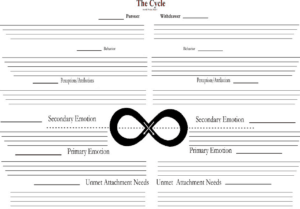In Part 1, we discussed how common it is for couples to get stuck in patterns and allow perceptions to take over the way they communicate. Remember, those patterns are more likely to be a perception issue rather than a communication issue. In Part 2, we will explore a resource I find useful in helping couples uncover these perceptions.
When couples get stuck, they are no longer able to truly hear. Their perceptions keep them from seeing what is below the surface and that the cycle is the culprit here, not their significant other.
One of the most helpful tools I have found to begin to identify these patterns is the EFT Cycle worksheet, seen below.

Typically with the couples I work with, one partner tends to pull away, or withdraw when the other partner becomes critical or aggressive. Underneath their behavior is the perception that is driving each of their reactions or responses. The other partner tends to pursue the other to connect and may be hurt by the other partner’s distancing.
As couples continue to track their steps through the cycle, they identify what is called Secondary Emotions, which are active responses to their perceptions. These can be feelings like anger, jealousy, or resentment. Going a little deeper, the couple begins to understand the emotions underneath, called Primary Emotions. These are emotions like hurt, rejection, abandonment, or shame.
As the couple comes to learn about their needs in these moments, their perceptions can begin to change and they will no longer see their partner as the aggressor. They will understand that they feel alone or and need to know that they matter to their partner.
Both Hold me Tight and the EFT Cycle Worksheet are two great resources I use with couples. However, for some couples, these perceptions may not allow for the safe exploration of these resources alone. Finding a trained couples therapist could be another resource in breaking that cycle and changing the perceptions in your relationship.
Dustin Ellis, CIT
dellis@growcounseling.com

